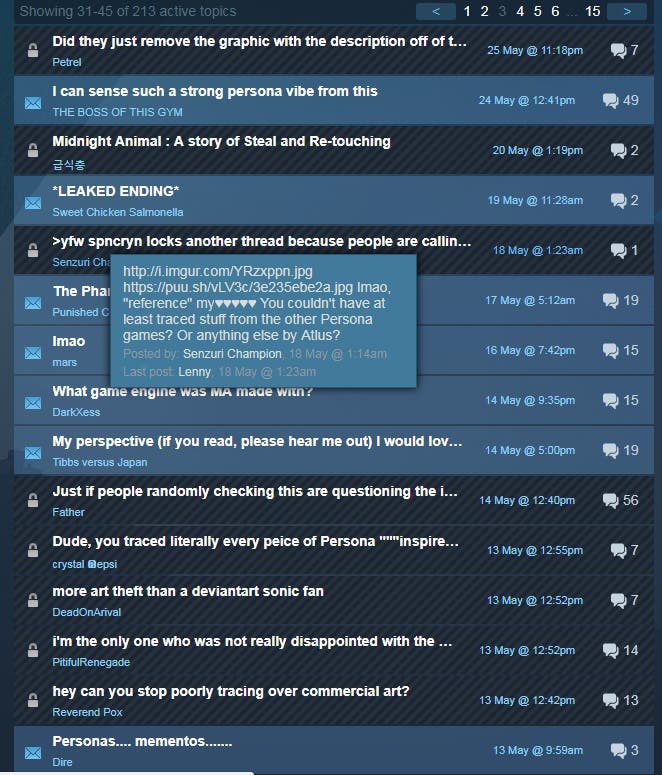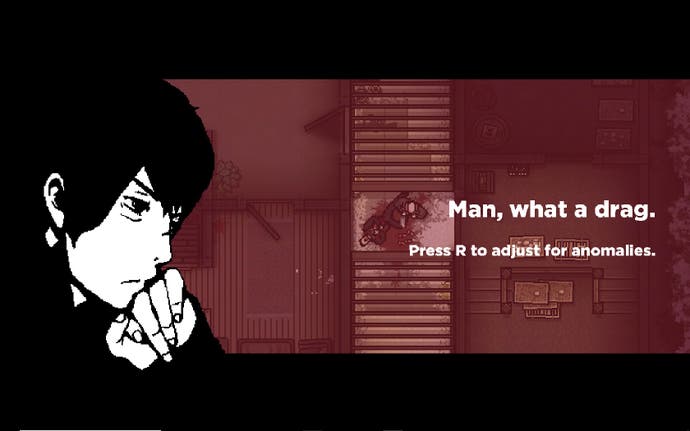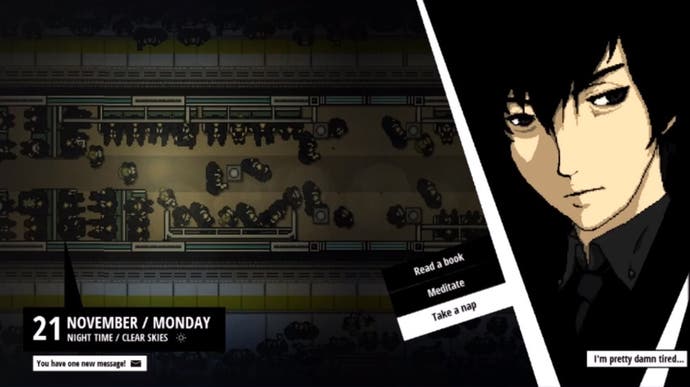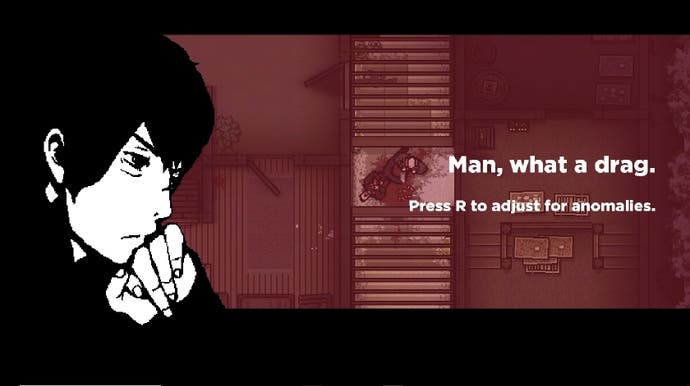The messy story behind the Hotline Miami mod that never was
"I just felt like a f***ing failure."
It's four in the morning on 18th February 2017, and a 19-year-old modder and writer named Spencer Yan is sitting in his college dorm at his computer, with a server full of Discord users eager for him to drop the latest update for Midnight Animal, a total conversion mod and original story built upon the bloodstained, bullet-riddled blueprints of Hotline Miami.
At this point, Yan has worked on Midnight Animal for over a year. The project has grown from a Mod DB page and some well received YouTube trailers to being greenlit on Steam. He has permission from developers Dennaton Games to use the source code, and an entire community of engaged and supportive Hotline Miami fans behind him.
What the community isn't yet aware of is the drastic creative reimagining the project has undergone in the time since they last saw an update. A transformation from what its creator describes as a "comically dark, pseudo-cyberpunk revenge story" to something far more personal, philosophical and poignant.
Yan has been up for around three days at this point, catching short snatches of sleep in between preparing the update. He fires it off finally at 4am and immediately leaves his dorm, walking along the river he can see from his window to a nearby parking lot where, for the first time in several months, he allows himself to feel like he's accomplished something big.
This sense of accomplishment, Yan says, was "soundly destroyed" when he returned to his dorm 20 minutes later and began to read the comments.
The backlash had erupted minutes after the update went live.
11 months prior, Yan had failed his first semester at university, losing the scholarship that served as a shield against his parent's threats to cut financial support if he took classes on "something useless". This pressure spiralled into long periods of isolation. He lost touch with high school friends. After the breakdown of a serious romantic relationship, Yan made several attempts on his own life.
In June 2016, Yan delayed Midnight Animal indefinitely, citing personal problems in a now deleted Steam post.
It's worth considering exactly how much attention Midnight Animal had got at this point. A reveal trailer posted on YouTube in September of 2015 currently sits around 50,000 views, with dozens of excited and supportive comments underneath it. Dennaton had been adamant for over a year now they were finished with Hotline Miami. For fans looking for another fix of neon-streaked hyperviolence, the original vision of Midnight Animal, which placed you in the role of a contract killer working for, and eventually betraying, the 50 Blessings group from Hotline Miami 2, was the best methadone in town. Yan was happy to provide, until the realities of the attention the project had gained began to creep up on him.
Midnight Animal was announced in September 2015. In the ensuing time, Yan had gone from enjoying the attention his skills as a modder had brought him, making friends in the community and dreaming of a future as a systems designer for Ubisoft, to feeling the project had "drifted completely" out of his control. In his mind, Midnight Animal was never intended as the sequel to Hotline Miami 2 some fans were hoping for. Still, he admits the perception of him as the custodian of the franchise allowed him to take advantage of the clout.
"I suppose on some level I definitely should take a lot of responsibility for, however unintentionally, cultivating that image of myself," Yan reflects from his home in the New York suburbs, feeling he got caught up "amidst the ensuing excitement".
"I had no idea how to communicate with a mass audience," Yan adds. "Although the Greenlight campaign was, by all means, an overwhelming success, I started to feel really uncomfortable about it around then. It wasn't just the comments telling me how lazy my work was or how shitty and ill-informed my design decisions were; it was also random people contacting me asking about providing music, or having to seriously begin messaging record labels, many of them pretty well-established, having to deal with their management trying to explain to them what I was making, that it wasn't commercial, that I had no income whatsoever and was just some random kid working on this thing because he liked it."
These anxieties about the project, as well as Yan's personal circumstances, eventually resulted in the indefinite delay. After the June announcement, he wouldn't touch Midnight Animal for another five months. Then, at the height of his depression, he played Persona 4.
"It absolutely shook me."
At this point in time, Yan was living in "near total isolation", only leaving the house to get food in the small hours of the morning. He says Persona 4's "sheer positivity and emotional forcefulness" led to some serious self reflection.
"All of a sudden, compared to the profound positivity Persona offered, my work - bleak and hopeless, a total reflection of my state of mind at the time - seemed totally impotent. I felt ashamed of it."
Persona 4 led Yan to Persona 5, where characters attempting to free themselves from negativity resonated with him just as strongly.
"Suddenly it didn't matter so much to me I was making a Hotline Miami mod. I saw it more as, this is my project and this is how I'm dealing with the world, this is how the world will see me. Persona affected me deeply, almost as much as Hotline Miami did; it seemed only appropriate that my work should pay testament to both."
The isolation and depression. The breakup. The renewed sense of purpose and philosophical grounding Persona had given him. All of these fed into the redesigned project.
Midnight Animal was now titled Midnight Animal: a Story of Love and Forgetting in Four Parts.
The story was "effectively" the same, says Yan, but with a focus on the consequences of violence on mental health, and the importance of friends as a support network. The previous combat sections were still intact, but took a backseat to life-sim elements.
"I wanted the story to be tragic rather than edgy." says Yan. "I wanted it to feel moving, rather than confrontational."
It's here we return to that college dorm room, where, sitting at his computer at 4am, Spencer Yan gave the world their first look at the Story of Love and Forgetting update.
He'd thought the community would be "shocked" at how far the project had progressed in the time since the last update.
"Well, they were certainly shocked, I'll say that much."

For the next few months, both Midnight Animal's Steam Forums and Yan's personal inbox were flooded with comments and messages criticising the mod's anime style character portraits, or the word 'love' in the subtitle. On an ongoing development blog, Yan opened up about his life circumstances, outlining how they'd informed the project's new direction. In a depressingly predictable turn, his openness and honesty would be weaponised against him.
"Every single morning I'd wake up and the first thing I'd see when I checked my inbox was a whole litany of messages telling me how much of a fucking disappointment I was and that I should kill myself and that my girlfriend left me because I was a 'beta weeb chink cuck faggot'."
Abhorrent as these comments are, a lot of them won't come as a huge shock to anyone familiar with the darker side of gaming forums. In this case, it was specifically the emotional honesty and move away from violence that many seemed to take issue with.
It's worth noting that, at this time, comments on Midnight Animal's Steam forum weren't entirely negative. There's plenty of support and excitement on display in the 284 comments on this post where Yan presents some of his reasoning behind the mod's redesign. Still, as anyone who's shared creative work with the internet can tell you, it only takes one negative comment - never mind hundreds of them - to drown out the support.
Then, in April of 2017, Persona 5 released outside of Japan. While Western Persona fans celebrated, for Yan, it would mean a whole new wave of controversy and harassment.

In redesigning Midnight Animal, Yan had actively referenced several character portraits from Persona 5 to act as portraits for his own. Midnight Animal's protagonist, The Investigator, was one such design, utilising the art from the Persona 5 character Goro Akechi, whose treachery and cowardice Yan wished to evoke. On top of this, the masks already prominent in Hotline Miami had cadence with the titular Yungian Personas, leading Yan to expand on these ideas as a core creative conceit in the redesigned Midnight Animal.
As a non-commercial fan project, Yan claims his intention here was to pay homage to his influences.
A vocal group on the Persona 5 subreddit disagreed, however, and the post eventually spread to 4Chan's /v/ board, resulting in an outpouring of hostility from a whole new community.
"So now you've got two communities that never before had interacted with each other, the Hotline Miami community, and the Persona community, just hating over the game for different reasons." Pi0h1 tells me. He's an independent developer and moderator on the Hotline Miami subreddit, who met Yan through modding tutorials Spencer had uploaded to YouTube. "The Hotline Miami community because Spencer didn't make the game they thought he would make, and the Persona community because someone used graphics from their game."
"I don't think tracing graphics from Persona was right," Pi0h1 adds. "At the same time, it's not like taking graphics from AAA games and using them is unheard of when it comes to free fan-games."
"All this commotion from the new controversy stirred up some of the older arguments from several months prior," Yan tells me. "I spent the next year or so reading daily about how pathetic of a human being I was."
Forum anonymity drew the worst out of the community and they, in turn, drew the worst out of Yan. It doesn't take long to find posts that go beyond criticism and directly attack Yan's Chinese heritage. Steam forums agreeing Midnight Animal's 'slit-eyed' creator deserves to 'die of stomach cancer'. Then there's the posts where Yan calls someone he's in an argument with a "f*g" and a "sand n****r". I asked Yan about these comments directly, for which he apologises, admitting immaturity and a flirting with right-wing ideology, which he now disavows. It's a depressingly common thread for young men who spend most of their time online, where social isolation and over exposure to slurs divorced from context or consequence can open those with an unstable world-view or self image up to predatory ideologies.
Yan himself admits to me this "isn't really an excuse".
"Along the way I got pretty burned out and said some pretty offensive things which I now deeply regret, and those too were dug up and added as fuel to the rage. The end result was this thing I had thought was my highest point as both a developer and as a person in general turned out to literally be devastating."
The story of Midnight Animal doesn't end here, however. At this point, Yan had recently graduated. He was unemployed, and had no real plans for the future. It was time to get back to work.
Yan split the remaining work into two projects: The Exegesis of John the Martyr, into which went the narrative elements, and The Document of Midnight Animal, an "open-ended sandbox platform" showcasing "the abstract violence of MA free of narrative context". Both released to positive, if limited reception. These projects were intended to both be the start of something bigger, but before that could occur, Yan burnt out.
The four-year ordeal that had begun when a barely 18-year-old Spencer Yan started messing around with source code, to Midnight Animal's rise in popularity, to his reputation in the community going from franchise saviour to Phil Fish-esque pariah; the ordeal that saw temporary fame, isolation, depression and suicide attempts, finally took its toll. Yan decided he was done.
In the months that followed, Yan would occasionally return to the Hotline Miami subreddits.
"Another content creator, with whom I've shared a fairly tense history due to philosophical disagreements, made a post essentially asking, 'why aren't there any new ideas or innovations in mods?' The comments, all from his circle of friends, posted some ideas that sounded vaguely familiar: boss fights, extensive environmental destruction, health systems, different objectives, dynamic lighting, ad nauseam. In short, without fail, they were things that I had attempted and mostly succeeded at implementing in my own work months, if not years ago."
This cemented Yan's view that Midnight Animal was seen as an "unmentionable failure", not just by the community, but by peers. Seeing other projects praised brought on resentment, and Yan began to see his own work not only as lost time, but as "a mark of condemnation". Yan would join online communities for Visual Novel fans or Gamemaker forums anonymously, wanting to help others but anxious of letting them know who he was.
"People would revile my work on MA, all the while scavenging its decompiled source code - stolen in the same way I had stolen Hotline Miami's source code - for their own work."
"My friends had not even graduated yet I watched as they were summarily picked up by tech firms and hedge funds who paid more in signing and relocation bonuses than I'll probably ever make in my entire life. I wasn't taken seriously by anyone: to other developers, I was just some amateur modder working with some niche 2D game; and to non-developers, my work, utterly lacking in commercial value or potential, was at best a frivolous hobby that was taking up too much time and effort. It wasn't that I felt particularly like an impostor, or a fraud. I just felt like a fucking failure."

When I first spoke to Spencer Yan, I wanted to tell the stories of modders who had poured themselves into passion projects that never saw the light of day. I'd been reading the recent RomChip, and several articles there had made the same, lucid argument: the history of games is also a history of the games that never made it. Not just the big studio failures where everyone, at the very least, ended up with a paycheck, but the hundreds of hours sacrificed by talented amateurs. I wanted to end this piece having told these stories, and maybe finish with some easy, conclusive quotables that might have helped anyone embarking on a creative work in the future. Spencer Yan's story doesn't have any of those, so if you're after a bow to wrap things up, maybe stop reading after this insight from Pi0h1.
"Even if at no point you claim your game is meant to be an 'x' (In the case of Midnight Animal, a Hotline Miami 3), if the public agrees it is 'x', then they are going to judge it like it's an 'x'."
For Yan though, the messy journey he's been on doesn't offer up any easy lessons.
"If I've learned anything at all, it's that making games has become an act of self-affirmation for me, perhaps akin to something like resistance. In one sense, it was resistance against a world which is actively indifferent to my existence... In another sense though, it was a resistance against the future itself, against being not good enough, not skilled enough, not hard-working enough, not economically viable enough, not hungry enough to be able to grit my teeth and reach out for my dream like so many others."
There's a recurring dream sequence in Hotline Miami where we watch Jacket, the protagonist, converse with three masked figures. On your third meeting, a woman wearing a horse mask named Don Juan offers up the following:
"No matter who you are, bearing too much weight... Inevitably leads to the collapse of everything."
Hopefully, that's something Yan keeps in mind for the future. After all, he's back working on a new project.
In the UK and Ireland, Samaritans can be contacted on 116 123 or email jo@samaritans.org or jo@samaritans.ie. In the US, the National Suicide Prevention Lifeline is 1-800-273-8255. In Australia, the crisis support service Lifeline is 13 11 14. Other international suicide helplines can be found at www.befrienders.org.












